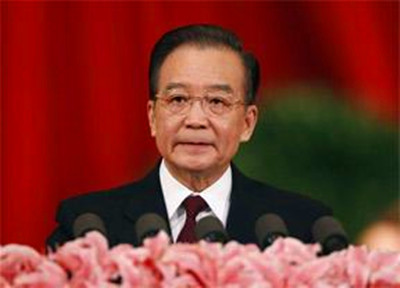
中央人民廣播電臺記者:總理,您好。剛才那位外國同行也提到中國的房價,您也闡述了我們調控房價的三方面政策措施。其實從去年開始,國務院就出臺了不少關于調控房地產的政策措施,被稱為歷史上“最嚴厲的房地產調控”。今年您在政府工作報告當中也重申,要堅定不移地搞好房地產調控。現在社會上有擔心,就是這些政策措施能不能落實到位?會不會半途而廢?請問總理,您怎么看待這個問題?
China National Radio: Just now my foreign colleague raised the issue of rising housing prices, and you mentioned the three policy measures that the government has taken to control housing prices. We have seen that since last year, the State Council has introduced a succession of measures to bring down housing prices, and some view these measures as the harshest ever. You reiterated in the government work report that the government will resolutely regulate the real estate market. Will these measures be fully implemented, or will the government give up halfway in their implementation?
溫家寶:關于房價的調控,我覺得當前最重要的是各項政策措施的落實。對于中央來講,就是要加強對地方落實房價調控政策的檢查力度,真正實行問責制。同時,密切跟蹤和分析房地產市場發展的形勢,進一步研究有針對性的宏觀調控措施。對地方來講,就是要認真落實房地產調控的責任。比如,首先要公布政府調控房地產的政策和房價控制目標。在這里,我想特別提出,我們三管齊下,其實還有一項非常重要的措施,那就是加快保障性住房建設。也就是說從供求上解決房地產市場存在的問題。對于保障性住房建設,人民群眾中有許多擔心,他們總的是贊成的,但也有許多憂慮。我們提出,今年再開工建設保障性住房1000萬套,明年再建1000萬套,在今后五年建設3600萬套。保障性住房除了棚戶區改造以外,主要是公租房和廉租房,這個方向必須明確。這里就有一個資金落實的問題,中央今年將向地方補助1030億元,地方財政也相應加大投入,但還必須更廣泛地利用社會資金。對于保障性住房,土地供應必須單列,做到應保盡保。有一件事情非常重要,現在就應該提到日程上來,那就是保障性住房的設計、建設必須有高標準、高要求,也就是說要確保質量、安全和環保。特別是在環保上,從設計到建設整個過程,都要實行節能。這是中國房地產建設的一大機會,如果丟掉了,十分可惜。我在這里想強調一點,就是對于保障性住房建設以后,管理和退出機制現在就要著手制定規則,形成一個完整的從建設到管理、退出的機制,使保障性住房質量和效益得到保證,使保障性住房將來的管理也得到保證。
Premier Wen Jiabao: On controlling rising housing prices, what's essential now is to ensure the full implementation of relevant policies and measures. The central government will step up its inspection of the work of local governments. We must implement an accountability system in real earnest. At the same time, we will follow closely and analyze new developments in the real estate market, and study targeted macro-control measures in this field. The local governments must conscientiously perform their relevant responsibilities. For example, they must release policies on regulating the property market and targets for controlling housing prices. Actually, in regulating the real estate market, we have adopted another very important measure. That is, we will further increase the supply of government-subsidized housing units. This means that we will try to address problems in the housing market by increasing supply. With respect to the government-subsidized housing, the people are generally supportive of our policies, though they have also voiced quite some concerns. I would like to say that we have set the target of building 10 million such housing units this year and another 10 million next year. In total, we plan to build 36 million government-subsidized housing units in the next five years. In addition to renovated houses in run-down areas, they mainly comprise public rental housing and low-rent housing. It is essential that we ensure sufficient funding for the construction of those houses. As far as the funding is concerned, the central government will transfer a total of 103 billion RMB yuan in subsidies to local governments this year. Local governments will also increase their fiscal input. We also need to make greater use of non-government capital. It is important that we designate specific sites for the construction of government-subsidized housing and ensure that such designated sites will be used only for this purpose. We need to ensure that the design and construction of those houses will meet high quality standards and will be safe, environment-friendly and energy-efficient. I believe this presents a great opportunity for property development in China. And we must not miss this opportunity. I want to emphasize that we must start now to formulate the management and return mechanisms of the low-income housing and put in place a complete system governing the construction, management and return of these houses to ensure the quality and efficiency and proper management.











